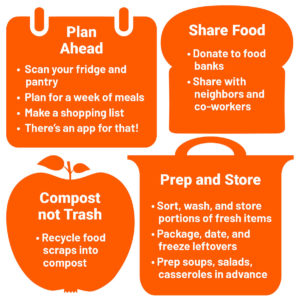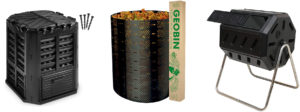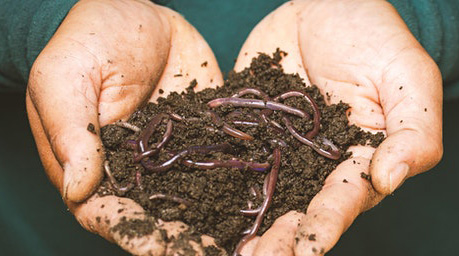No Food Left Behind
Americans waste food , on average about 238 pounds of food every year (one-fifth of the food they buy), costing them $1800 per year. In the US, food loss and waste account for 4% of greenhouse gas emissions, 14% of all freshwater use, and 24% of landfilled waste. Reduce food waste and save money with smart shopping, meal planning, and food storage. Donate edible food you can’t eat, and compost food scraps to help your food waste come full cycle as natural fertilizer to grow your garden.

 Produce and leftovers are the most frequently wasted types of foods, usually because they spoil before we get around to eating them. On average, Americans waste 21% of the food they buy. That’s like buying five bags of groceries and leaving one behind at check-out.
Produce and leftovers are the most frequently wasted types of foods, usually because they spoil before we get around to eating them. On average, Americans waste 21% of the food they buy. That’s like buying five bags of groceries and leaving one behind at check-out.
Leave no food behind with these tips and resources. We’ve made storing and composting leftover food easy.
Cost: Free
Overbuying, over-preparing, and improper storage lead to spoiled food that has to be thrown out. What’s more, an estimated 80% of Americans toss edible food prematurely because of confusion over product date labels.
There are a wide variety of phrases used on labels to describe quality dates, and they don’t mean what you think they do. Even if the date passes during home storage, the food should still be safe and wholesome if handled properly (i.e., refrigerated or sealed) up until the time spoilage becomes obvious. If there is no mold, pests, off odors, off colors, or off textures, the product is safe to consume.
Cost: Free
If you have more food than you can eat, share it with neighbors, co-workers or friends, or donate the excess to a local food pantry or food bank.
Where to Donate:
Cost: $0-100
Dumping food waste into landfills just doesn’t make sense. Trapped under layers of garbage, rotting organic matter not only releases methane (a potent greenhouse gas), but it also becomes unavailable where it’s needed most – back in the soil. Composting is a slam-dunk for you and the environment. It keeps food waste out of landfills and saves you money by providing free, organic soil for your garden. Did you know that the single largest material in our everyday trash is food?
Following a few simple steps, you can keep a home compost pile that is odorless, pest-free, and makes “black gold,” like magic!

 Composting with worms, or Vermicomposting, rapidly breaks down food waste into a super-charged organic compost. One pound of worms can turn 65 pounds of garbage into garden compost in 100 days. A great option for apartment/condo dwellers.
Composting with worms, or Vermicomposting, rapidly breaks down food waste into a super-charged organic compost. One pound of worms can turn 65 pounds of garbage into garden compost in 100 days. A great option for apartment/condo dwellers.
Find out what’s happening and join in with our comprehensive community events listing.
Look for these classes
Food waste is a huge problem, globally and locally. About one-third of the U.S. food supply is wasted every year. About half the water used to produce our food also goes to waste since agriculture is the largest human use of water.
Disposing of food means using more land for landfills and garbage-burning plants that produce harmful greenhouse gas emissions – not to mention the wasted contributions of human care and energy as well as the emissions generated by growing, harvesting, storing and shipping the food you just tossed in the trash. And wasting food adds insult to injury for hungry families in our community. Bottom line – food waste is a huge waste all around. By composting your old food and food scraps instead of trashing them in the landfill, you take ownership for that waste, instead of disproportionately passing that burden to others in your community or onto future generations.
Buying only the amount of food you can eat is the first step. Do some basic meal planning a week at a time, then make a list of what you’ll need. Make sure to peruse your pantry and refrigerator before shopping to see what you already have. Prep food when you get home by slicing, chopping or dicing so it’s ready to cook or eat. You can even divide it into portions for snacks and lunches. Store food properly to keep it fresher longer, and freeze items you won’t eat quickly. Use leftovers for lunches, soups or casseroles.
Most of us have experienced the “eyes bigger than our stomachs” syndrome when dining out. After all, it’s a treat to eat food we don’t have to prepare, especially when everything on the menu looks yummy. Follow these tips to make sure you don’t bite off more than you can chew:
There are a couple different ways to get started with composting. If you live in an apartment or condo without a lot of outdoor space for a compost bin, your best bet would be to join a community composting program offered by groups like Sunshine Community Compost. They provide all of the training and supplies and they also manage the compost pile for you. All you have to do is collect your food scraps at home and drop them off at one of their compost stations. Plus, you get the added benefit of being able to take home fully processed compost to enrich the soil of your patio plants! If there is no compost station near you, you can also work with the organization to get a compost station started at your building. If you are looking to start a compost bin or pile in your own yard, there are several discounted starter kits and “composting 101” classes to help you learn what you can compost and how to maintain your compost pile in a way that is odorless, pest-free, and makes “black gold”!
A well-managed compost pile should not attract rats. Only plant-based matter should be composted – never meat or meat products that produce odors that would attract rats. Don’t put cooking fats or oil, dairy products, cat litter (clean or used) or dog poop in your compost either
Using an enclosed compost bin with a lid or a rotating barrel on an elevated frame helps to prevent rats, raccoons and other animals from getting to compost.
Compost is created by natural decomposition of organic matter by bacteria, fungi, and various other small critters. Don’t panic if you see slugs, millipedes, sowbugs, beetles, or worms in your compost pile. Those are critical on-the-job workers chewing and grinding your food and yard waste into fertile soil for your garden.
Here are 10 steps you can take to improve the sustainability of your business:
By setting specific goals and implementing targeted initiatives, you can make meaningful strides towards sustainability while working towards becoming a Sarasota County Green Business Partner.
Submit your food-related question to local experts. If selected, they will answer and feature your question on our FAQ. Not all questions will be answered.
This site protected by reCAPTCHA and the Google Privacy Policy and Term of Service apply.
©2026 Science and Environment Council of Southwest Florida | Site by Chariot.